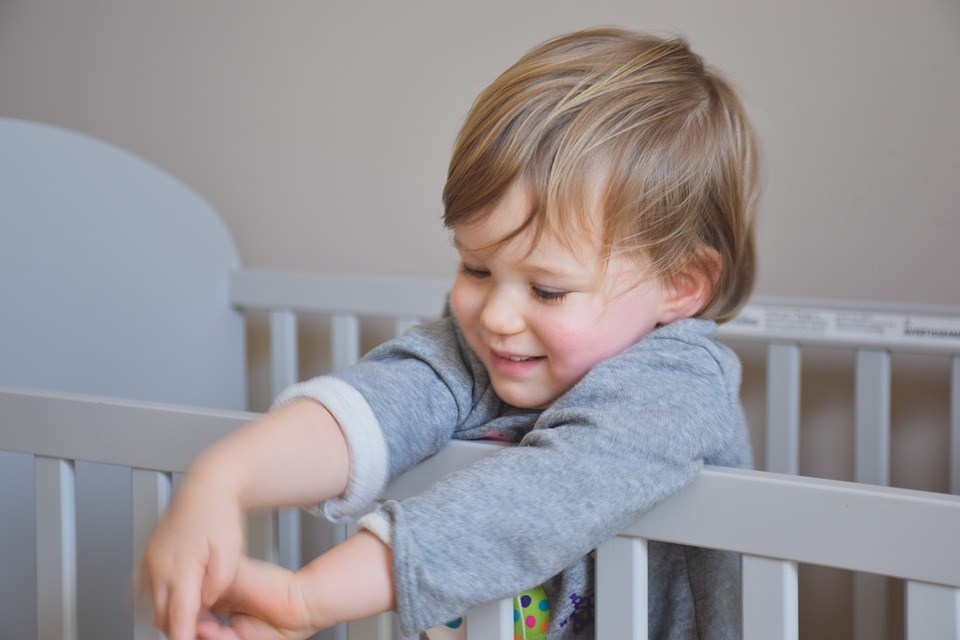Dear Attachment Parent: My toddler just outgrew his crib. How do I get him to stay in his room if we get a toddler bed?
Being separated from your caregivers and protectors before you are old enough to fend for yourself is scary to most young children. For most of human existence, it would have been a very dangerous thing. Our children are all the descendants of prehistoric babies who did not get eaten by hungry wild animals. How did they avoid that fate? It wasn’t by staying quietly by themselves in a remote corner of the village where saber-toothed tigers roamed. It was by loudly alerting their parents if they were separated and joining the rest of the village by any means necessary.
Today, our children are not at a high risk of tiger attacks when they are sleeping in their own rooms. Unfortunately for those who prefer to have separate sleeping quarters from their toddlers, toddler brains don’t know that. They are programmed to believe they need to stay close.
Your toddler’s brain does not realize that this creature is not roaming around your house in search of a snack.
To meet the need to stay close, many attachment parents choose to set up a family bed where everyone in the family is welcome. Some use a king size bed and some join several beds together to make a family mega-bed. This works great if, like, me, you can’t sleep well while crunched for space.
Other attachment parents have kids who sleep just fine in their own rooms. They often choose to stay with their children until they fall asleep. At the baby and toddler stages, this helps children feel safe and secure. As kids move out of the early years and into the elementary school years, they may be able to fall asleep on their own, but still enjoy having their parents around. As most parents have observed, bedtime is when kids get philosophical.
Where do starts come from? What is infinity? Why are there colors?
It’s also a time when life’s big questions come up.
Am you going die one day? Am I going to die one day?
To be sure, lying down with your kids isn’t always a magical, connecting experience. But it also isn’t something that will last forever. It’s hard to find the time during these formative years to talk about the big questions during a busy day when there are interruptions from siblings, pots about to boil, doorbells, barking dogs, and errands to run. If our kids know we available at the end of the day when everything is dark, still, and quiet, and the interruptions are few, we create an important opportunity for them to confide in us. And that’s something I hope will last forever.
At this point you might be thinking, that sounds lovely, but in reality I have a kitchen to clean, other kids to put to bed, and I want to spend a little time with my partner once in a while. I can’t spend the better part of my evening doing Bedtime Philosophy Hour each night. I hear you. To get your kids used to the idea of being in bed on their own, start small. Here are some options.
- Hang out together for a little while, and then take a break to do a small “errand” like getting a glass or water. Eventually you can work up to longer errands, telling your child you’ll come back to check on them in 10 minutes.
- Listen to a podcast using headphones or read an e-book while you stay in the room, so your child feels safe and comfortable, but gets to used to falling asleep without needing to be wrapped around you.
- Listen to an audiobook or guided meditation together. Once it becomes routine, you may be able to turn on the audio, tuck in your child, and say goodnight, and let them fall asleep solo with only the occasional check-in.
Of course, there is absolutely nothing wrong with nursing a baby, toddler, or preschooler to sleep, or staying with your child until they are completely asleep. There is absolutely no need to “train” them. They will get there on their own when they are ready. Until then, keep in mind that falling asleep each night next to a someone you love, feeling safe and secure, is a wonderful thing for humans of all ages.
Do you have a question for an attachment parent? Email us at [email protected].


